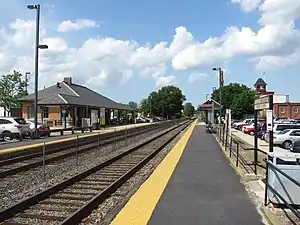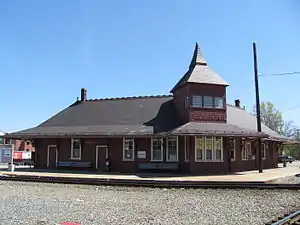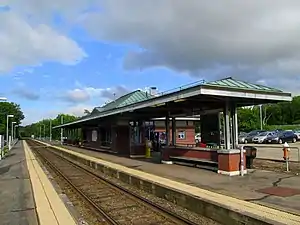Franklin Line
The Franklin Line, part of the MBTA Commuter Rail system, runs from Boston's South Station in a southwesterly direction toward Franklin, Massachusetts, utilizing the Northeast Corridor before splitting off onto the namesake Franklin Branch. Most Franklin Line trains connect to the Providence/Stoughton Line at Readville, though some weekday trains use the Dorchester Branch (Fairmount Line) to access South Station. Most weekday trains, and all weekend trains, bypass Hyde Park and Plimptonville. Several weekday trains originate at Norwood Central or Walpole.
| Franklin Line | |||||||||||||||||||||||||||||||||||||||||||||||||||||||||||||||||||||||||||||||||||||||||||||||||||||||||||||||||||||||||||||||||||||||||||||||||||||||||||||||||||||||||||||||||||||||||||||||||||||||||||||||||||||||||||||||||||||||||||||||||||||||||||||||||||||||||||||||||||||||||||||||||||||||||||||||||||||||||||||||||||||||||||||||||||||||||
|---|---|---|---|---|---|---|---|---|---|---|---|---|---|---|---|---|---|---|---|---|---|---|---|---|---|---|---|---|---|---|---|---|---|---|---|---|---|---|---|---|---|---|---|---|---|---|---|---|---|---|---|---|---|---|---|---|---|---|---|---|---|---|---|---|---|---|---|---|---|---|---|---|---|---|---|---|---|---|---|---|---|---|---|---|---|---|---|---|---|---|---|---|---|---|---|---|---|---|---|---|---|---|---|---|---|---|---|---|---|---|---|---|---|---|---|---|---|---|---|---|---|---|---|---|---|---|---|---|---|---|---|---|---|---|---|---|---|---|---|---|---|---|---|---|---|---|---|---|---|---|---|---|---|---|---|---|---|---|---|---|---|---|---|---|---|---|---|---|---|---|---|---|---|---|---|---|---|---|---|---|---|---|---|---|---|---|---|---|---|---|---|---|---|---|---|---|---|---|---|---|---|---|---|---|---|---|---|---|---|---|---|---|---|---|---|---|---|---|---|---|---|---|---|---|---|---|---|---|---|---|---|---|---|---|---|---|---|---|---|---|---|---|---|---|---|---|---|---|---|---|---|---|---|---|---|---|---|---|---|---|---|---|---|---|---|---|---|---|---|---|---|---|---|---|---|---|---|---|---|---|---|---|---|---|---|---|---|---|---|---|---|---|---|---|---|---|---|---|---|---|---|---|---|---|---|---|---|---|---|---|---|---|---|---|---|---|---|---|---|---|---|---|---|---|---|---|---|---|---|---|---|---|---|---|---|---|---|---|---|---|---|---|---|---|---|
 Norwood Central station in June 2010 | |||||||||||||||||||||||||||||||||||||||||||||||||||||||||||||||||||||||||||||||||||||||||||||||||||||||||||||||||||||||||||||||||||||||||||||||||||||||||||||||||||||||||||||||||||||||||||||||||||||||||||||||||||||||||||||||||||||||||||||||||||||||||||||||||||||||||||||||||||||||||||||||||||||||||||||||||||||||||||||||||||||||||||||||||||||||||
| Overview | |||||||||||||||||||||||||||||||||||||||||||||||||||||||||||||||||||||||||||||||||||||||||||||||||||||||||||||||||||||||||||||||||||||||||||||||||||||||||||||||||||||||||||||||||||||||||||||||||||||||||||||||||||||||||||||||||||||||||||||||||||||||||||||||||||||||||||||||||||||||||||||||||||||||||||||||||||||||||||||||||||||||||||||||||||||||||
| Status | Operating | ||||||||||||||||||||||||||||||||||||||||||||||||||||||||||||||||||||||||||||||||||||||||||||||||||||||||||||||||||||||||||||||||||||||||||||||||||||||||||||||||||||||||||||||||||||||||||||||||||||||||||||||||||||||||||||||||||||||||||||||||||||||||||||||||||||||||||||||||||||||||||||||||||||||||||||||||||||||||||||||||||||||||||||||||||||||||
| Owner | Massachusetts Bay Transportation Authority | ||||||||||||||||||||||||||||||||||||||||||||||||||||||||||||||||||||||||||||||||||||||||||||||||||||||||||||||||||||||||||||||||||||||||||||||||||||||||||||||||||||||||||||||||||||||||||||||||||||||||||||||||||||||||||||||||||||||||||||||||||||||||||||||||||||||||||||||||||||||||||||||||||||||||||||||||||||||||||||||||||||||||||||||||||||||||
| Locale | Southeastern Massachusetts | ||||||||||||||||||||||||||||||||||||||||||||||||||||||||||||||||||||||||||||||||||||||||||||||||||||||||||||||||||||||||||||||||||||||||||||||||||||||||||||||||||||||||||||||||||||||||||||||||||||||||||||||||||||||||||||||||||||||||||||||||||||||||||||||||||||||||||||||||||||||||||||||||||||||||||||||||||||||||||||||||||||||||||||||||||||||||
| Termini | South Station Forge Park/495 | ||||||||||||||||||||||||||||||||||||||||||||||||||||||||||||||||||||||||||||||||||||||||||||||||||||||||||||||||||||||||||||||||||||||||||||||||||||||||||||||||||||||||||||||||||||||||||||||||||||||||||||||||||||||||||||||||||||||||||||||||||||||||||||||||||||||||||||||||||||||||||||||||||||||||||||||||||||||||||||||||||||||||||||||||||||||||
| Stations | 16 | ||||||||||||||||||||||||||||||||||||||||||||||||||||||||||||||||||||||||||||||||||||||||||||||||||||||||||||||||||||||||||||||||||||||||||||||||||||||||||||||||||||||||||||||||||||||||||||||||||||||||||||||||||||||||||||||||||||||||||||||||||||||||||||||||||||||||||||||||||||||||||||||||||||||||||||||||||||||||||||||||||||||||||||||||||||||||
| Service | |||||||||||||||||||||||||||||||||||||||||||||||||||||||||||||||||||||||||||||||||||||||||||||||||||||||||||||||||||||||||||||||||||||||||||||||||||||||||||||||||||||||||||||||||||||||||||||||||||||||||||||||||||||||||||||||||||||||||||||||||||||||||||||||||||||||||||||||||||||||||||||||||||||||||||||||||||||||||||||||||||||||||||||||||||||||||
| Type | Commuter rail | ||||||||||||||||||||||||||||||||||||||||||||||||||||||||||||||||||||||||||||||||||||||||||||||||||||||||||||||||||||||||||||||||||||||||||||||||||||||||||||||||||||||||||||||||||||||||||||||||||||||||||||||||||||||||||||||||||||||||||||||||||||||||||||||||||||||||||||||||||||||||||||||||||||||||||||||||||||||||||||||||||||||||||||||||||||||||
| System | Massachusetts Bay Transportation Authority | ||||||||||||||||||||||||||||||||||||||||||||||||||||||||||||||||||||||||||||||||||||||||||||||||||||||||||||||||||||||||||||||||||||||||||||||||||||||||||||||||||||||||||||||||||||||||||||||||||||||||||||||||||||||||||||||||||||||||||||||||||||||||||||||||||||||||||||||||||||||||||||||||||||||||||||||||||||||||||||||||||||||||||||||||||||||||
| Operator(s) | Keolis North America | ||||||||||||||||||||||||||||||||||||||||||||||||||||||||||||||||||||||||||||||||||||||||||||||||||||||||||||||||||||||||||||||||||||||||||||||||||||||||||||||||||||||||||||||||||||||||||||||||||||||||||||||||||||||||||||||||||||||||||||||||||||||||||||||||||||||||||||||||||||||||||||||||||||||||||||||||||||||||||||||||||||||||||||||||||||||||
| Daily ridership | 11,671 (2018)[1] | ||||||||||||||||||||||||||||||||||||||||||||||||||||||||||||||||||||||||||||||||||||||||||||||||||||||||||||||||||||||||||||||||||||||||||||||||||||||||||||||||||||||||||||||||||||||||||||||||||||||||||||||||||||||||||||||||||||||||||||||||||||||||||||||||||||||||||||||||||||||||||||||||||||||||||||||||||||||||||||||||||||||||||||||||||||||||
| Technical | |||||||||||||||||||||||||||||||||||||||||||||||||||||||||||||||||||||||||||||||||||||||||||||||||||||||||||||||||||||||||||||||||||||||||||||||||||||||||||||||||||||||||||||||||||||||||||||||||||||||||||||||||||||||||||||||||||||||||||||||||||||||||||||||||||||||||||||||||||||||||||||||||||||||||||||||||||||||||||||||||||||||||||||||||||||||||
| Line length | 27.4 miles (44.1 km)[2] | ||||||||||||||||||||||||||||||||||||||||||||||||||||||||||||||||||||||||||||||||||||||||||||||||||||||||||||||||||||||||||||||||||||||||||||||||||||||||||||||||||||||||||||||||||||||||||||||||||||||||||||||||||||||||||||||||||||||||||||||||||||||||||||||||||||||||||||||||||||||||||||||||||||||||||||||||||||||||||||||||||||||||||||||||||||||||
| Track gauge | 4 ft 8 1⁄2 in (1,435 mm) | ||||||||||||||||||||||||||||||||||||||||||||||||||||||||||||||||||||||||||||||||||||||||||||||||||||||||||||||||||||||||||||||||||||||||||||||||||||||||||||||||||||||||||||||||||||||||||||||||||||||||||||||||||||||||||||||||||||||||||||||||||||||||||||||||||||||||||||||||||||||||||||||||||||||||||||||||||||||||||||||||||||||||||||||||||||||||
| |||||||||||||||||||||||||||||||||||||||||||||||||||||||||||||||||||||||||||||||||||||||||||||||||||||||||||||||||||||||||||||||||||||||||||||||||||||||||||||||||||||||||||||||||||||||||||||||||||||||||||||||||||||||||||||||||||||||||||||||||||||||||||||||||||||||||||||||||||||||||||||||||||||||||||||||||||||||||||||||||||||||||||||||||||||||||
Foxboro station is located on a branch line, which connects with the Franklin Line at Walpole. Previously, trains only served the station during special events at Gillette Stadium. In October 2019, the MBTA began one-year pilot program of full-time service, the Foxboro Line.
History


The earliest predecessor to the Franklin Line began in 1835 when the Boston and Providence Railroad built a branch from Dedham to Readville, connecting with the main line from Boston to Providence. This was followed, in 1848, by the Norfolk County Railroad, which ran from Dedham to Walpole.[3] After various mergers and acquisitions, the line become part of the New York and New England Railroad until 1898, the New York, New Haven and Hartford Railroad until 1968, and, ultimately, Penn Central until its 1970 bankruptcy.
What is today's Franklin Branch was a portion of the Midland Line of the New Haven's Midland Division, the New Haven's secondary route between Boston and New York; the MBTA's Dorchester Branch and the abandoned segments from Franklin to Willimantic, Connecticut via Blackstone were the remaining components of the Midland Line. In 1910, the passenger route on the Midland Line was a regional inter-city train that continued to New York via the Highland Line segment of the Highland Division between Willimantic and Waterbury, Connecticut, then continuing down the Housatonic Railroad to the New Haven Line.[4] Service was eventually shortened to Waterbury in 1937.[5]
However, in the 1940s and early 1950s service, including the New Haven's Nutmeg and several unnamed trains from Boston to Hartford and Waterbury continued.[6] It was shortened to Blackstone when the two southern spans of the bridge crossing the Quinebaug River in Putnam, Connecticut washed out during Hurricane Diane in 1955. The bridge was never repaired, and the line was abandoned between Willimantic and Putnam in 1959.
Service to Blackstone was discontinued in April 1966 when the MBTA began subsidizing the line; Franklin and beyond were not in the MBTA district, meaning that the towns themselves had to subsidize service, and only Franklin agreed to do so.[7] The easternmost bridge over the Blackstone River in the March 17-19th flooding of the river; the line beyond Franklin was abandoned 3 years later,[8] and is now preserved in full as the Southern New England Trunkline Trail. Between 1973 and 1976, the Commonwealth of Massachusetts bought almost all track assets in Southeastern Massachusetts, including the Franklin Branch, from the Penn Central's bankruptcy trustees.
From the start of MBTA operations, Franklin was the terminus of the line. Service was extended to Forge Park/495 station on June 2, 1988, although the line retained its original name.[9][7] Forge Park/495 is not on the former NY&NE main line to Woonsocket, but instead on the former Milford & Woonsocket Railroad, which last saw passenger service in 1938.[10] The MBTA leased the branch from Conrail for the extension, with the possibility of future purchase.[7] In February 2020, the MBTA voted to purchase the line from Franklin to Milford for $13 million.[11]
Double tracking
In early 2019, the MBTA begin installation of an additional 3.8 miles (6.1 km) of double track - 3.3 miles (5.3 km) of new track plus the conversion of an existing siding) - between Walpole and Norfolk.[12] Major construction was completed in April 2020.[13]
The $30 million construction of an additional phase and preliminary design of a third were announced in November 2019. Phase 2 will add 3.5 miles (5.6 km) of double track between Franklin and Norfolk, with completion by the end of 2020; it will allow headways to drop from 45 to 35 minutes. Phase 3 is planned to complete double-tracking between just north of Franklin/Dean College station and just south of Readville station, including the modification of several stations.[14][12]
Foxboro service
%252C_September_2020.jpg.webp)
Until 1994, Boston–Foxboro service for Gillette Stadium events ran over the Providence/Stoughton Line, with a reverse move at Mansfield.[15] That year, Providence–Foxboro service was added, with Boston trains rerouted over the Franklin Line.[7] Initial intermediate stops were Back Bay, Dedham Corporate Center, and Norwood Central; Norwood Central was dropped beginning with the 2011 season.[16][17][18]
In September 2010, the MBTA completed a study to determine the feasibility of extending regular commuter rail service to Foxboro station via the Franklin Line. The study looked at extending some Fairmount Line service to Foxboro, running shuttle trains from Foxboro to Walpole, or a combination of both.[19] The MBTA planned to purchase trackage prior to restoring service; the Framingham Secondary, which provides access to Foxboro station, was acquired by the MBTA effective June 17, 2015. (CSX Transportation, the former owner of the branch, retained trackage rights over it.)[20]
In August 2017, the MBTA Fiscal Control Board approved an 11-month pilot program to test commuter rail service to Foxboro, with service planned to begin sometime in late 2018 or early 2019, although Fairmount Line advocates warned it might reduce service quality to existing Fairmount Line stations.[21] In October 2017, the MBTA indicated that service would begin on May 20, 2019.[22] Service during the trial period will consist of seven daily round trips - three during the morning peak period, three in the evening peak, and one midday.[23] The launch date was later delayed to October 21, 2019.[24][7]
By December 2019, daily boardings at Foxboro averaged 70 - one-third of the projected ridership.[25] Pilot service will be suspended from November 2, 2020 to Spring 2021 due to the COVID-19 pandemic.[26]
Milford extension
In July 2011, the Boston Region Metropolitan Planning Organization began studying the viability of extending Franklin Line commuter rail service to Hopedale and Milford. The study would update a 1997 MBTA evaluation that concluded costs outweighed the benefits of a possible expansion. Local officials believe increased population and track upgrades to the Grafton and Upton Railroad may increase the viability of an extension.[27] 8 miles of track from Franklin Junction to Milford were leased by the MBTA from Conrail for the Forge Park/495 extension and to establish the possibility of future service to Milford.[7] A 2004 analysis determined that the extension would cost $70.5 million and attract about 1,800 additional riders per weekday.[28]
Station listing
| Fare zone | Location | Mile (km)[29] | Station | Connections and notes |
|---|---|---|---|---|
| 1A | Boston | 0.0 (0.0) | ||
| 1.2 (1.9) | ||||
| 2.2 (3.5) | ||||
| 5.0 (8.0) | Served by Needham Line and Orange Line trains only | |||
| 6.5 (10.5) | Mount Hope | Closed November 2, 1979 | ||
| 1 | 8.4 (13.5) | |||
| 2 | 9.2 (14.8) | |||
| Dedham | 10.9 (17.5) | Endicott | ||
| 11.8 (19.0) | ||||
| 3 | Westwood | 12.5 (20.1) | Islington | |
| Norwood | 14.3 (23.0) | |||
| 14.8 (23.8) | ||||
| 4 | 16.6 (26.7) | Windsor Gardens | ||
| Walpole | 17.7 (28.5) | Plimptonville | Closed January 23, 2021 | |
| 19.1 (30.7) | Walpole | Junction with Framingham Secondary to Foxboro | ||
| Foxborough | 22.6 (36.4) | Located on the Framingham Secondary, served weekdays (as part of a pilot program) and for special events at Gillette Stadium | ||
| 5 | Norfolk | 23.0 (37.0) | ||
| 6 | Franklin | 27.5 (44.3) | Franklin/Dean College | |
| 30.3 (48.8) | ||||
| Blackstone, RI | 36.4 (58.6) | Blackstone | Closed April 24, 1966 | |
| Currently operating station | ||||
References
- "Commuter Rail Ridership Counts" (PDF). Massachusetts Bay Transportation Authority. January 28, 2019.
- "Ridership and Service Statistics" (PDF) (14th ed.). Massachusetts Bay Transportation Authority. 2014.
- "Dedham Historical Society". Dedham Historical Society. Retrieved 2010-08-10.
- Phillip A. Blakeslee (April 1953). "A Brief History of Lines West—The New York, New Haven and Hartford Railroad Co". Catskill Archive. Railroad Enthusiasts, Inc. Retrieved 23 March 2015.
- Karr, Ronald Dale (2017). The Rail Lines of Southern New England (2 ed.). Branch Line Press. p. 88. ISBN 9780942147124.
- "Table 18: Waterbury-Hartford-Putnam-Boston". THE SCENIC SHORELINE ROUTE SERVING NEW YORK AND NEW ENGLAND. New York, New Haven and Hartford Railroad. April 24, 1955. p. 30 – via Wikimedia Commons.
- Belcher, Jonathan. "Changes to Transit Service in the MBTA district" (PDF). NETransit.
- City of Woonsocket. "City of Woonsocket, Rhode Island - Commuter Rail Feasibility Study" (PDF). Greater City Providence. City of Woonsocket. p. 2. Retrieved 23 March 2015.
- Howe, Peter J. (June 2, 1988). "MBTA opens new station". Boston Globe – via Newspapers.com.

- Karr, Ronald Dale (1995). The Rail Lines of Southern New England. Branch Line Press. pp. 304–306. ISBN 0942147022.
- "Milford Secondary Acquisition" (PDF). Massachusetts Bay Transportation Authority. February 24, 2020.
- Didtamo, Rob (November 18, 2019). "Franklin Double Track" (PDF). Massachusetts Bay Transportation Authority.
- "Franklin Line Double Track". Massachusetts Bay Transportation Authority. Archived from the original on May 19, 2020.
- "FMCB Approves Franklin Line Double Track Phase 2 Work and Phase 3 Preliminary Design Work" (Press release). Massachusetts Bay Transportation Authority. November 18, 2019.
- "MBTA rail service is available to Patriots games". Boston Globe. September 12, 1993. p. 39 – via Newspapers.com.

- "T Patriots train!". Boston Globe. August 15, 1997. p. 86 – via Newspapers.com.

- "New England Patriots 2010 / 2011 Football Trains to Gillette Stadium". Massachusetts Bay Transportation Authority. Archived from the original on November 26, 2010.
- "New England Patriots 2011/2012 Football Trains to Gillette Stadium". Massachusetts Bay Transportation Authority. Archived from the original on September 7, 2011.
- Jacobs Engineering Group (September 1, 2010). "Foxboro Commuter Rail Feasibility Study: Final Report" (PDF). Massachusetts Bay Transportation Authority.
- Jessen, Klark (16 June 2015). "MassDOT Completes Framingham Secondary Rail Line Acquisition" (Press release). Massachusetts Department of Transportation. Retrieved 25 June 2015.
- "MBTA Board Approves Foxborough Commuter Rail Pilot". Foxborough, MA Patch. 2017-08-14. Retrieved 2017-08-19.
- Gomes, Alexandra (November 1, 2017). "Foxboro's MBTA pilot program won't launch until 2019". Sun Chronicle. Retrieved November 8, 2017.
- Bentley, Jimmy (November 29, 2018). "Foxborough Starting Pilot For Commuter Rail Service To Boston". Foxoborough Patch.
- Vaccaro, Adam (March 27, 2019). "Foxborough train service pushed back to fall". The Boston Globe.
- Hand, Jim (December 12, 2019). "Foxboro train service slow to attract riders". The Sun Chronicle.
- DiAdamo, Rob (September 14, 2020). "Fall 2020 Commuter Rail Schedule Changes" (PDF). Massachusetts Bay Transportation Authority.
- "Franklin rail line could expand to Milford and Hopedale". Milford Daily News. Retrieved 2011-08-14.
- Central Transportation Planning Staff (January 2004) [May 2003]. "Chapter 5C: Service Expansion" (PDF). 2004 Program for Mass Transportation. Boston Metropolitan Planning Organization. Archived from the original (PDF) on 20 February 2012. Retrieved 17 July 2012.
- "Ridership and Service Statistics" (PDF) (14th ed.). Massachusetts Bay Transportation Authority. 2014.
External links
| Wikimedia Commons has media related to MBTA Franklin Line. |